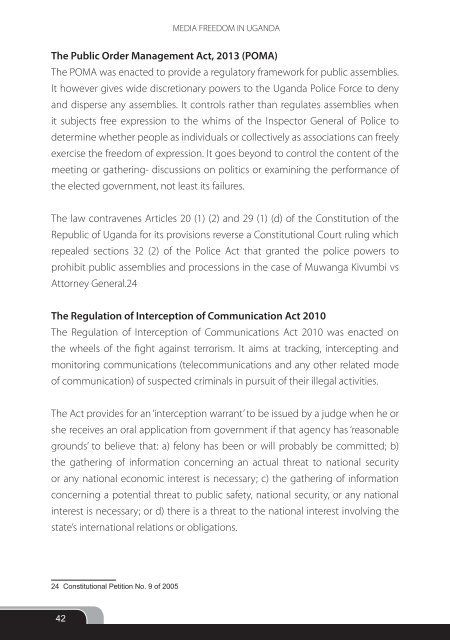Media_Freedom_in_Uganda_Analysis_of_inequitable_legal_limitations
Media_Freedom_in_Uganda_Analysis_of_inequitable_legal_limitations
Media_Freedom_in_Uganda_Analysis_of_inequitable_legal_limitations
Create successful ePaper yourself
Turn your PDF publications into a flip-book with our unique Google optimized e-Paper software.
MEDIA FREEDOM IN UGANDA<br />
The Public Order Management Act, 2013 (POMA)<br />
The POMA was enacted to provide a regulatory framework for public assemblies.<br />
It however gives wide discretionary powers to the <strong>Uganda</strong> Police Force to deny<br />
and disperse any assemblies. It controls rather than regulates assemblies when<br />
it subjects free expression to the whims <strong>of</strong> the Inspector General <strong>of</strong> Police to<br />
determ<strong>in</strong>e whether people as <strong>in</strong>dividuals or collectively as associations can freely<br />
exercise the freedom <strong>of</strong> expression. It goes beyond to control the content <strong>of</strong> the<br />
meet<strong>in</strong>g or gather<strong>in</strong>g- discussions on politics or exam<strong>in</strong><strong>in</strong>g the performance <strong>of</strong><br />
the elected government, not least its failures.<br />
The law contravenes Articles 20 (1) (2) and 29 (1) (d) <strong>of</strong> the Constitution <strong>of</strong> the<br />
Republic <strong>of</strong> <strong>Uganda</strong> for its provisions reverse a Constitutional Court rul<strong>in</strong>g which<br />
repealed sections 32 (2) <strong>of</strong> the Police Act that granted the police powers to<br />
prohibit public assemblies and processions <strong>in</strong> the case <strong>of</strong> Muwanga Kivumbi vs<br />
Attorney General.24<br />
The Regulation <strong>of</strong> Interception <strong>of</strong> Communication Act 2010<br />
The Regulation <strong>of</strong> Interception <strong>of</strong> Communications Act 2010 was enacted on<br />
the wheels <strong>of</strong> the fight aga<strong>in</strong>st terrorism. It aims at track<strong>in</strong>g, <strong>in</strong>tercept<strong>in</strong>g and<br />
monitor<strong>in</strong>g communications (telecommunications and any other related mode<br />
<strong>of</strong> communication) <strong>of</strong> suspected crim<strong>in</strong>als <strong>in</strong> pursuit <strong>of</strong> their il<strong>legal</strong> activities.<br />
The Act provides for an ‘<strong>in</strong>terception warrant’ to be issued by a judge when he or<br />
she receives an oral application from government if that agency has ‘reasonable<br />
grounds’ to believe that: a) felony has been or will probably be committed; b)<br />
the gather<strong>in</strong>g <strong>of</strong> <strong>in</strong>formation concern<strong>in</strong>g an actual threat to national security<br />
or any national economic <strong>in</strong>terest is necessary; c) the gather<strong>in</strong>g <strong>of</strong> <strong>in</strong>formation<br />
concern<strong>in</strong>g a potential threat to public safety, national security, or any national<br />
<strong>in</strong>terest is necessary; or d) there is a threat to the national <strong>in</strong>terest <strong>in</strong>volv<strong>in</strong>g the<br />
state’s <strong>in</strong>ternational relations or obligations.<br />
24 Constitutional Petition No. 9 <strong>of</strong> 2005<br />
42


